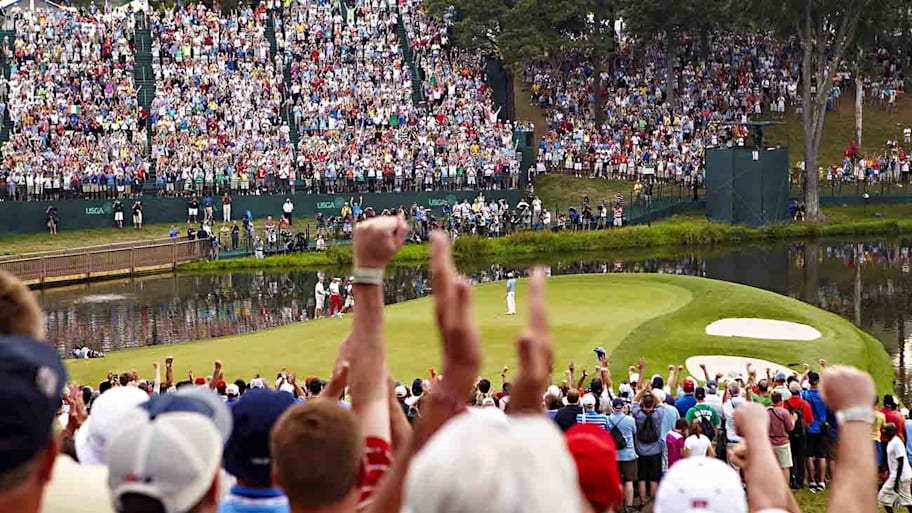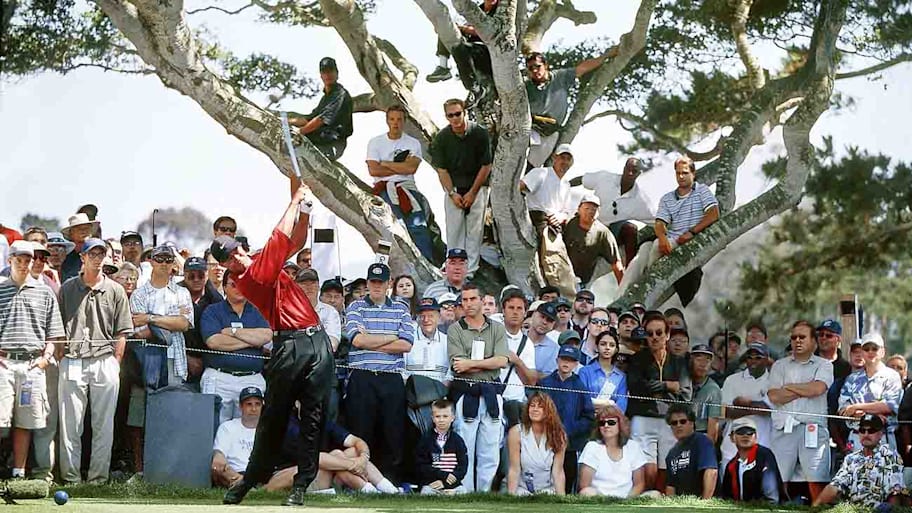Major championships come in all shapes and sizes.
There’s the thrilling putts on the final hole that get the job done by the skin of a player’s teeth. And there are performances that are essentially decided hours, if not days, in advance.
Scottie Scheffler did the latter at this week’s British Open. The world No. 1 cruised to a four-stroke victory at Royal Portrush in Northern Ireland for his fourth career major title. He finished at 17 under par, four clear of runner-up Harris English. Scheffler's win was never in doubt on Sunday afternoon at Royal Portrush.
Scheffler's win was impressive, but doesn't quite crack the list of largest major-championship victory margins of the 21st century. (In fact, Scheffler actually won the PGA Championship earlier this year by five shots.) What are the biggest major blowouts this century? Here are our picks.
2000 U.S. Open at Pebble Beach: Tiger Woods Wins by 15 strokes over Ernie Els and Miguel Ángel Jiménez
It wasn’t a fair fight, to quote NBC’s Roger Maltbie. Amid the “Tiger Slam,” Woods achieved the largest margin of victory in a major championship, besting Old Tom Morris’s 13-stroke win in the 1862 British Open. Afterward, Els said, “If you put Old Tom Morris with Tiger Woods, he’d probably beat him by 80 shots right now.”
Twenty-five years later, it’s still perhaps the most dominant win ever.
“It’s a sports performance that I think will never be repeated,” NBC play-by-play voice Dan Hicks said earlier this year.
2000 British Open at St. Andrews: Tiger Woods wins by eight strokes over Ernie Els and Thomas Bjørn
Just a few months after his heroics at Pebble, Woods did it again, winning at “the home of golf” and becoming the fifth player to complete the career Grand Slam. Woods didn’t hit into any of the course’s 112 bunkers all week and shot 19 under par to set a new major championship record for a winning score. Mark Calcavecchia called Woods, just 24, “the chosen one” after that week.
2010 British Open at St. Andrews: Louis Oosthuizen wins by seven strokes over Lee Westwood
Back at the home of golf, the 27-year-old had the most dominant performance in a British Open since Woods a decade earlier for his first and only major title, while leading the field in driving accuracy.

2011 U.S. Open at Congressional Country Club: Rory McIlroy wins by eight strokes over Jason Day
Two months after his final-round Masters collapse, the Northern Irishman, at 22 years old, finished at 16 under and became the youngest U.S. Open champion in 88 years. In all, McIlroy set 12 championship records that week, including hitting 86% of greens in regulation.
2012 PGA Championship at Kiawah Island: Rory McIlroy wins by eight strokes over David Lynn
Now a bona fide superstar, McIlroy won his second major and broke Jack Nicklaus’s margin of victory record from 1980 by sinking a birdie putt on the 72nd hole.
2014 U.S. Open at Pinehurst: Martin Kaymer wins by eight strokes over Rickie Fowler and Erik Compton
The German captured his second major by opening with consecutive 65s en route to setting the second-best four-day total in U.S. Open history (behind McIlroy in ‘11) and became the seventh wire-to-wire champion of the U.S. Open.

2020 U.S. Open at Winged Foot: Bryson DeChambeau wins by six strokes over Matthew Wolff
The 1974 U.S. Open is known as “the Massacre at Winged Foot,” where the scoring average was 76.73, the highest ever. Fast forward to a fanless, pandemic U.S. Open in September at the famed course, DeChambeau bombed his way to a final score of 6 under, the lowest for a Winged Foot championship. In the months leading up to the U.S. Open, DeChambeau began bulking and believed his win changed “the way people think of the game.”
2020 Masters: Dustin Johnson wins by five strokes over Sungjae Im and Cam Smith
In the last quarter century, the Masters has generally had the narrowest margin of victory of the four majors. The largest, though, was Johnson claiming his second career major in a November, gallery-less Masters. Johnson finished at 20 under to break the tournament’s scoring record by two strokes. He was also the first player in the 84-year history of the Masters to card four rounds in the 60s.
This article was originally published on www.si.com as The Largest Major-Championship Blowout Wins This Century .
